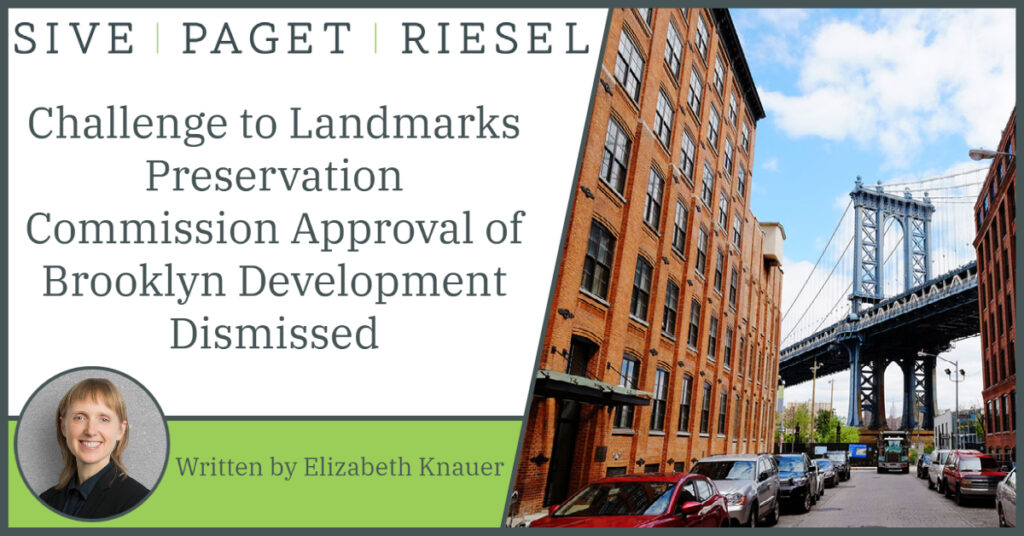Blog

Challenge to Landmarks Preservation Commission Approval of Brooklyn Development Dismissed
On January 12, 2023, Justice Ingrid Joseph, New York State Supreme Court, Kings County, dismissed a petition seeking to halt a residential development in Crown Heights, Brooklyn. In Sterling Place BK-NY Block Association Inc., et al. v. City of New York, et al. (Kings County Index No. 510458/2022), petitioners—neighbors of the development—challenged the New York City Landmarks Preservation Commission’s (LPC) issuance of a certificate of appropriateness (COA) for the project. The challenge primarily asserted that LPC should have held a second public hearing after the project was modified to address comments of the LPC and the public. The project is located in the Crown Heights North II Historic District on the former rear yard of the adjacent former Brooklyn Methodist Episcopal Home for the Aged and Infirmed, an institutional building constructed in the late 19th and early 20th Century. The Northeast Conference of Seventh Day Adventists, the current owners of the building, sold the rear yard to developer Hope Street Capital to provide funds for necessary repairs to allow a parochial school to re-occupy in the building after it was vacated for safety reasons.
Because the project is in a designated historic district, LPC was required to determine whether the project was “appropriate” for its historic setting. Through a lengthy, iterative review process—including a statutorily required public hearing—the development team modified the design and reduced the scale of the project to account for comments from both the LPC and the public. LPC ultimately approved the final design in May 2021.
The petitioners asserted that the changes made between the project as presented at the public hearing and the final approved design were so significant that LPC was required to hold an additional public hearing, based on prior case law establishing that a second hearing could be required where a project design “substantially deviates” from the one that was the subject of a hearing. They further questioned the substance of LPC’s determination that the project was appropriate for the neighborhood. Petitioners’ claims sought to alter LPC’s approval procedures in two respects. First, they would require LPC to formally determine that no substantial deviation occurred between the final approved design and the initial design. Second, they would require LPC to conduct additional public hearings where design changes were made in response to public or LPC commissioner comments, which under the prevailing case law are presumed to not constitute a substantial deviation.
In July 2022, the Court denied petitioners’ motion for a preliminary injunction. In an approximately 30-page decision and order, Justice Joseph found that “petitioners have failed to demonstrate that any of LPC’s determinations in granting the COA were based upon an error in law, lacked a rational basis, or were arbitrary, or capricious.” She found that LPC, as the agency charged with interpreting the landmarks law, acted within its discretion in determining that no substantial deviation from the original project design occurred. She further rejected the petitioners’ argument that this decision had to be made by a vote of the LPC commissioners. Reviewing the substance of the COA, Justice Joseph further held that LPC appropriately considered all relevant factors in approving the design, taking into account the broader neighborhood.
Work on the project has proceeded since the denial of the preliminary injunction. The Court’s decision finally disposing of the case largely rested on its reasoning in the prior decision denying the preliminary injunction. Justice Joseph also noted a recently decided case, Hilbertz v. NYC, in which the Appellate Division, Second Department reversed Kings County Supreme Court’s determination that an LPC approval of a different project, also proposed in Crown Heights, was arbitrary and capricious.
SPR attorneys Elizabeth Knauer and David Paget represented the developer Hope Street Capital in the proceeding.